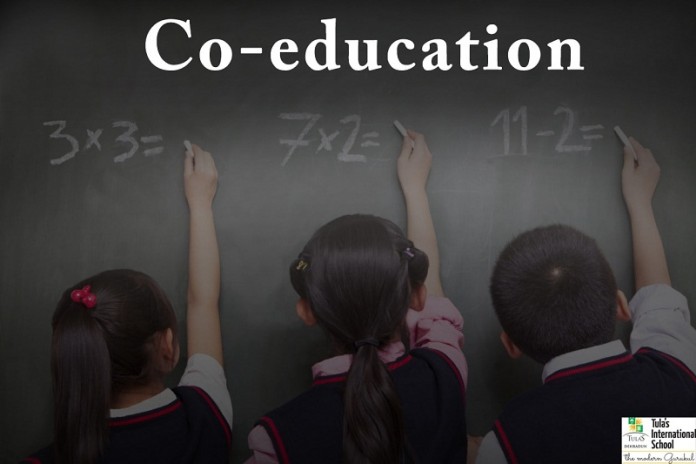Punjab region shuns old traditions; opens arms to Co-Ed system
A study by Tula’s International School Dehradun
A study by Tula International School Dehradun reveals that 70 percent parents now believe that co-ed system is better than single gender schools for their children’s overall development
Indian parents are changing and they are changing for good. This time we saw change in Punjab which is typically a conventional state when it comes to social values and norms. The parents in Punjab are becoming broad minded. For the first time they showed that they are not ready to compromise on education of their children and for quality education they are more open to co-ed system than single gender schools. They are even ready to send their kids to a mixed gender residential school because they have started accepting that the academic achievements are soared when both the sexes compete together in the classrooms.

Important Announcement – EasyShiksha has now started Online Internship Program “Ab India Sikhega Ghar Se”

Tula’s International School, one of the prominent co-education schools in Dehradun, conducted a study recently via interviewing 2000 parents in Punjab to understand the ‘parent’ sentiment towards sending their children for co-ed boarding education institutes. The research was conducted within different cities of Punjab. T he study revealed a perceptive uptick in the adoption of co-ed boarding/ residential schools in India – from 18% in 2016 to 33%, by end of 2017. It was found with changing times Punjabi parents are showing great open mindedness towards co-ed boarding system. The results are noteworthy: many parents within the identified geography feel that boarding education system is important for overall child learning and development but co-ed residential learning is much more effective.
Top Courses in Software Engineering
Parents cite the reasons why Punjab shows openness towards co-ed Boarding education is because the academic achievements are soared when both girls and boys study together in a healthy competitive atmosphere. 70% of parents (out of 2000) mentioned that a lot of schools with a decent female-to-male ratio tend to do better in academics and are often seen to be the toppers of examinations unlike the students in gender-segregated classrooms.
The study revealed one interesting fact that it is the ‘Relative or Peer Affluence’ which influences the parents to take decisions in Punjab.
In addition, Tula’s study also found that the parents have started believing that co-ed boarding is all about accepting and working toward ‘Gender Inclusiveness’. The system also inculcates a feeling of healthy competition among the students. It helps the students to become broad minded and follow equality in their lives.
Simultaneously, the research revealed that today’s parents also wish to inculcate feeling of diversity among their children and co-learning surely enables in such an upbringing. They also accept that co-ed boarding education teaches students to think beyond regular norms and helps them to become independent in every aspect.
Empower your team. Lead the industry
Get a subscription to a library of online courses and digital learning tools for your organization with EasyShiksha
Request NowQ. Are EasyShiksha's internships truly free?
Yes, all internships offered by EasyShiksha are completely free of charge.
Q. How can I apply for an internship with EasyShiksha?
You can apply by visiting our website, browsing available internships, and following the application instructions provided.
Q. What types of internships are available through EasyShiksha?
EasyShiksha offers a wide range of internships across technology, business, marketing, healthcare, and more. Opportunities are continuously updated.
Q. Will I receive a certificate upon completing an internship?
Yes, upon successful completion, you will receive a certificate recognizing your participation and achievements.
Q. Are EasyShiksha's internship certificates recognized by universities and employers?
Yes, the certificates are recognized by universities, colleges, and employers worldwide.
Q. Is the download of certificates free or paid?
Access to internships and courses is free, but there is a small fee to download certificates, covering administrative costs.
Q. When can I start the course?
You can choose any course and start immediately without delay.
Q. What are the course and session timings?
These are fully online courses. You can learn at any time and pace. We recommend following a routine, but it depends on your schedule.
Q. What will happen when my course is over?
After completion, you will have lifetime access to the course for future reference.
Q. Can I download the notes and study material?
Yes, you can access and download course materials and have lifetime access for future reference.
Q. What software/tools would be needed for the course?
All necessary software/tools will be shared during the training as needed.
Q. I’m unable to make a payment. What should I do?
Try using a different card or account. If the problem persists, email us at info@easyshiksha.com.
Q. Do I get the certificate in hard copy?
No, only a soft copy is provided, which can be downloaded and printed if required.
Q. The payment got deducted but shows “failed”. What to do?
Technical errors may cause this. The deducted amount will be returned to your account in 7-10 working days.
Q. Payment was successful but dashboard shows ‘Buy Now’?
Sometimes payment reflection is delayed. If it takes longer than 30 minutes, email info@easyshiksha.com with the payment screenshot.
Q. What is the refund policy?
If you face technical issues, you can request a refund. No refunds are issued once the certificate has been generated.
Q. Can I enroll in a single course?
Yes, select the course of interest, fill in the details, make payment, and start learning. You will also earn a certificate.
Q. My questions are not listed above. I need further help.
Contact us at info@easyshiksha.com for further assistance.
Apart from the parents’ views on co-education the study also found that Internationalism has made coed education curriculum dynamic, and has given a new dimension to the teaching learning process, which Punjab duly acknowledges when sending their students to get a global/ international education equivalent in India.
ALSO READ: korean-cultural-center-organized-painting-comp
Get Course: International-Finance-for-Beginners







































































